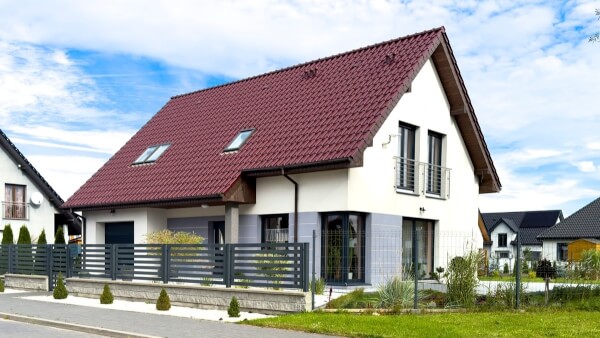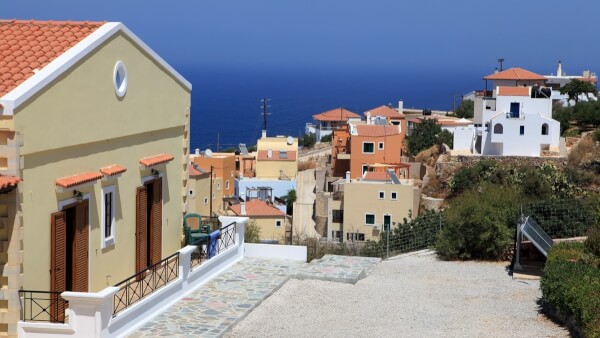Property tax in Pakistan for foreigners (UK guide)
Read our essential guide to property tax in Pakistan for foreigners and UK expats, including taxes on buying, selling and renting out property.

Dreaming of moving to Ireland? It’s easy to see why so many UK expats head to the Emerald Isle, with its breathtaking scenery, buzzing cities and affordable property. And it’s just a short hop from the UK, so you’re never too far from friends and family.
But just how easy is it to buy property in Ireland as a foreigner? Here, we’ll walk you through everything you need to know. This includes property prices in Ireland, the best places to live, how to get a mortgage and much more. So, let’s get started.
If you’re looking for ways to save money on currency exchange when buying property in Ireland, check out the money services provider Wise. You can send large transfers with Wise for low fees* and great exchange rates - making it ideal if you’re sending a secure international transfer.
Ireland’s property market seems to be holding up well in the wake of the coronavirus pandemic. House prices rose 8.44% in 2021¹, but it’s very much a sellers market as demand for property continues to rise. The supply of property is struggling to keep up with demand², which could potentially mean battles between buyers.
The great news for non-Irish citizens is that there aren’t any nationality or residency restrictions on who can buy property in Ireland³. This means that foreigners should face no hurdles when it comes to buying a home.
Anyone can buy property in Ireland, including Irish citizens, EU/EEA citizens and non-EU citizens³. You can even be a non-EEA national, and you don’t have to live in Ireland to be able to buy a home.
However, it’s important to note that property ownership doesn’t automatically give you the right to live in Ireland. If you aren’t an Irish or UK citizen, you may have to apply for a residence permit, depending on your circumstances.
The UK leaving the European Union has created a new category of British buyers looking to own property in Ireland and live or gain access to the EU.
The right to buy property in Ireland isn’t reserved for EU citizens, so British nationals are free to snap up homes and commercial property there⁴. And as the UK and Ireland are part of a Common Travel Area, UK citizens retain the right to live in Ireland even after Brexit⁵.
But British buyers may find Irish property more expensive post-Brexit. This is because the value of the pound against the euro has fallen by around 15% (as of 2021)⁶ compared to pre-referendum levels.
Like some other European countries, Ireland has a ‘Golden Visa’ scheme which grants residency permits to foreigners investing in property.
The eligibility conditions are quite strict, however. It’s not just as simple as buying a home and being granted a visa. You’ll need to invest at least €2 million for three years in a real estate investment trust that is listed on the Irish stock exchange⁵.
The price of property in Ireland varies considerably, depending on property type, location and whether you buy in a thriving major city like Dublin or a more rural spot.
On average though, property in Ireland tends to be cheaper than the UK. The price per square metre for a city centre apartment in Ireland is €3,870 (£3,224), while in the UK it’s €5,098 (£4,247)⁷.
To give you an idea of how far your money will go in Ireland, here’s an overview of average prices for different properties⁸ in Ireland’s most popular destinations.
| 1-bed apartment | 2-bed terraced house | 3-bed semi-detached | 5-bed detached | |
|---|---|---|---|---|
| Dublin | €146,000 - €371,000 | €208,000 - €525,000 | €287,000 - €724,000 | €514,000 - €1,314,000 |
| Cork | €136,000 | €177,000 | €262,000 | €535,000 |
| Limerick | €103,000 | €135,000 | €200,000 | €408,000 |
| Galway | €128,000 | €167,000 | €247,000 | €505,000 |
| Waterford | €89,000 | €116,000 | €172,000 | €351,000 |
| Donegal | €57,000 | €74,000 | €103,000 | €209,000 |
| Sligo | €63,000 | €82,000 | €114,000 | €230,000 |
Where you start your property search in Ireland depends on your budget, and whether you’d like to live near a city or are dreaming of a peaceful life in the Irish countryside.
To help you decide, let’s run through a few of the most popular destinations for UK expats and buyers.
This world-famous city has all the shops, restaurants and culture you expect of a capital, but it’s pleasantly green and surprisingly compact.
Dublin is known for its buzzing nightlife, along with its whiskey, live music and great food. You’ll meet plenty of Brits, as there are around 300,000⁹ of them living in Ireland, and many have settled in the capital.
And if you want to hop over to the UK or travel further afield, Dublin couldn’t be better connected. Property prices are certainly more expensive in Dublin than other cities and towns in Ireland, but it could be worth it to be in the heart of the action.
The lively city of Galway, which attracts both tourists and students in large numbers, boasts a fantastic choice of colourful shops, pubs and cafes. It’s also known for its enthusiastic sports scene, bustling markets, exceptional educational facilities and popular annual arts festival. You’ll find all of this nestled within fascinating mediaeval ruins, looking out onto the water where the river Corrib meets the Atlantic Ocean.
County Waterford on the south-east coast of Ireland is one of the cheapest places in the country to buy property. This is perhaps why so many British expats have been drawn here, particularly retirees. This sleepy city is rich in history and incredibly pretty, with beaches, hiking trails and mountains to explore.
If you’re dreaming of the rural life, you could snap up a property bargain in beautiful County Donegal in the north. It is rather remote and doesn’t have a big city of its own, but areas such as Downings and Rathmullan are more accessible and boast more amenities - although they are a little more expensive.
County Sligo is the unofficial music capital of Ireland, where virtually every pub and bar offers live music every night and the calendar is packed with music and arts festivals. Sligo also has an illustrious literary history, an energetic local sports scene, and a spectacularly rugged countryside setting.
West Cork is one of the most popular spots in Ireland for British expats, many of whom live in the Best charming villages of Skibbereen, Baltimore and Castletownshend.
The region will bowl you over with its gorgeous scenery, thriving local art and music scene, friendly people and pleasantly mild climate. Plus, the Atlantic coast is right on your doorstep, perfect for fans of surfing, kayaking and sailing. This also means exceptional seafood, famous as some of the freshest and most delicious in the world.
If you’re living in the UK, it could be useful to use an estate agent based in Ireland. A professional property expert or agency who understands the market can hunt down suitable properties on your behalf, and help you understand the buying process.
To find a property agent in Ireland, start at the Property Services Regulatory Authority (PSRA) website. Here, you’ll find a list of licensed estate agents.
You can also visit the Golden Pages website (the Irish equivalent of the UK’s Yellow pages) or do an online search for agents operating in areas you’re interested in.
You can also start your property hunt yourself, by entering your criteria and searching on major Irish property websites such as¹⁰:
Ireland shares many of the same property types as the UK, but you may be surprised to find more Georgian homes there. You can also find charming 19th century workers cottages, and ‘Dutch Billy’ homes - these are tall, narrow homes in long terraces, in a style inspired by Dutch and Belgian architecture. Ireland also has lots of new build homes, if you’re not after a period style.
Which property type you choose will depend on your needs, family size and budget, as well as the housing stock available in your target Irish destination.
Getting a qualified surveyor in to inspect the property you want to buy is essential. After all, the Regency property you’ve fallen in love with could be hiding some serious structural issues.
Just like in the UK, there’s no legal obligation in Ireland for either the seller or their estate agent to disclose any issues with the condition of the property⁹. So, you’ll need to appoint an independent surveyor to carry out a building inspection. You can find one using the Society of Chartered Surveyors Ireland (SCSI) register.
There are three types of survey, each providing an increasing level of detail⁹:
All homes listed for sale in Ireland must have a Building Energy Rating (BER)³, which tells you how energy efficient the property is. This is well worth checking, as it’ll affect your energy bills.
You should also check whether the property is a High Radon Area³. Radon is a radioactive gas which forms when uranium in the ground decays, and it can cause lung cancer. You can check the Radon Risk Map and find more information from the Environmental Protection Agency.
While the steps to buying a home in Ireland are very similar to the UK, here’s a run-through of what you can expect from the process¹¹:
Generally speaking, the legal requirements for buying property in Ireland are pretty straightforward. There are a few key points to remember though, including:
It’s usually much easier to get a mortgage from an Irish lender if you’re already living in Ireland, or are an Irish citizen. If you’re a foreigner and are living abroad, you may find it difficult. What’s more, most UK banks would be unlikely to give you a mortgage on a property in Ireland¹².
Luckily, there are some solutions available. The first is to choose an Irish lender which has a strong presence in the UK. A mortgage broker with expertise in both UK and Irish markets can help you track down the right lender.
You can also move to Ireland for a short time before you purchase your property. Lenders may prefer you to have a track record of living in Ireland for at least six months, and working there for at least 12 months¹³.
Once you’ve found a mortgage you’re eligible for, here are the key facts you need to know before you apply¹²:
Here’s a quick overview of the main costs involved in buying property in Ireland⁹:
You’ll also need to budget for the cost of taking out home insurance and life insurance.
If you’re buying a property in Ireland while still living in the UK, your purchase will involve a foreign currency exchange - from GBP to EUR. This could mean you’re at the mercy of fluctuating exchange rates. The same goes for making other payments, such as solicitor’s fees or booking moving companies.
Thankfully, there’s a safe and cost-effective way to manage your money between two countries. Open a Wise multi-currency account and you can send money from the UK to Ireland for small, transparent fees. Even better, you’ll always get the mid-market exchange rate. It could work out to be significantly cheaper compared to using your bank.
Sending money with Wise is quick, secure and trackable, so you can proceed with your Irish property purchase in complete confidence.
Please seeTerms of Use for your region or visitWise Fees & Pricing for the most up to date pricing and fee information.
Sources used for this article:
Sources checked on 13-04-2022.
*Please see terms of use and product availability for your region or visit Wise fees and pricing for the most up to date pricing and fee information.
This publication is provided for general information purposes and does not constitute legal, tax or other professional advice from Wise Payments Limited or its subsidiaries and its affiliates, and it is not intended as a substitute for obtaining advice from a financial advisor or any other professional.
We make no representations, warranties or guarantees, whether expressed or implied, that the content in the publication is accurate, complete or up to date.

Read our essential guide to property tax in Pakistan for foreigners and UK expats, including taxes on buying, selling and renting out property.

How much does it cost to build a house in Poland as a UK expat? Find out in our essential guide, covering everything you need to know.

How much does it cost to build a house in Greece as a UK expat? Find out in our essential guide, covering everything you need to know.

Read our comprehensive guide to buying a house abroad, including how to arrange finance for overseas property purchases.

Read our roundup of 8 of the best places to buy land in the world as a Brit, looking at average land prices, buyer’s costs and more.

Read our guide to selling property in India and bringing money to the UK, covering taxes, transfer methods and other essential information.